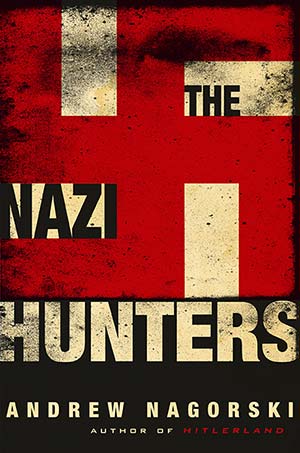Some books are to be tasted, others to be swallowed, but The Nazi Hunters left a bad taste in my mouth. The topic is simply distasteful: Nazis, the Holocaust they executed, the justice that finally caught up with them—or never did. I can’t blame the book or author for my dyspeptic response. Andrew Nagorski ’69—an award-winning foreign correspondent who spent decades trotting the globe—is a dashing teller of tales.
2016: Summer Book Review: No Happy End

And if the stories have a familiar—maybe heroic?—ring, they also beg for the unromantic telling that Nagorski, who met and interviewed every living protagonist, brings them.

My favorite—perhaps precisely because he stand out in this crowd—is the scholarly lawyer Fritz Bauer, thanklessly facing his homeland’s ugly record of mass murder as a state attorney general in West Germany.
Rafi Eitan, who led the Israeli Mossad team that nabbed Adolf Eichmann in Argentina, cuts a more romantic figure, but Nagorski captures his ordinariness. Beate and Serge Klarsfeld are still at work in France, on the Nazi trail, as is Eli Rosenbaum, who rose to head the U.S. Justice Department’s Office of Special Investigations that belatedly sought to expel war criminals who were living quietly in the United States.
Nagorski eschews any overarching narrative to the works and days of these men and women. They quarreled with each other; they let guilty perpetrators get away; they embraced dubious allies. As a result, there’s no satisfying conclusion after the hodgepodge of criminal trials, international tribunals, public shaming and media exposure that the various pursuers of Nazis conducted. There’s no Happy End, because there’s no satisfying response to the Holocaust, in the end.
Movies—and books and TV—demand an ending, a plot that resolves. Nagorski sources our conventional image of the Nazi hunter in movie melodramas such as The Odessa Files, Marathon Man, The Boys from Brazil and Judgment at Nuremberg. (I wish he had discussed Orson Welles’s noirish The Stranger.) Movies also need stars. Nagorski does well to criticize the popular portrayal of Wiesenthal as the “Jewish James Bond.” Any real Nazi hunter spent more of the last 70 years in dusty archives than on an action-adventure film set. The very use of an epithet like “Nazi hunter” to describe a historical figure might seem to suggest, “Hey, that story would make a good movie.” But it turns out that goodness can be as banal as evil, and Nagorski is admirably prosaic about the real work of the Nazi hunters. His writing is less cinematic, more realistic.
What response to the Holocaust could be pleasant to read? Perhaps a narrative of revenge? Even that would be rough justice: many—if not most—Nazis walked away and got on with their lives.
Dame Rebecca West, reporting from the 1946 Nuremberg trials, described that courtroom as “a citadel of boredom.” In 1961 Hannah Arendt remarked on the banality of the Eichmann trial in Jerusalem. A like mood of weary melancholy hangs over The Nazi Hunters, as these dogged men and women get on with their work—more pains-taking than derring-do.
In the Balkans—another sad corner of Europe between the two world wars—West wrote that it “is sometimes very hard to tell the difference between history and the smell of skunk.” Nagorski doesn’t try to mask the lingering stink of Nazi and post-Nazi history. The Nazi Hunters is a gloomy tale, but difficult to forget—and remembering, in the end, provides some comfort.